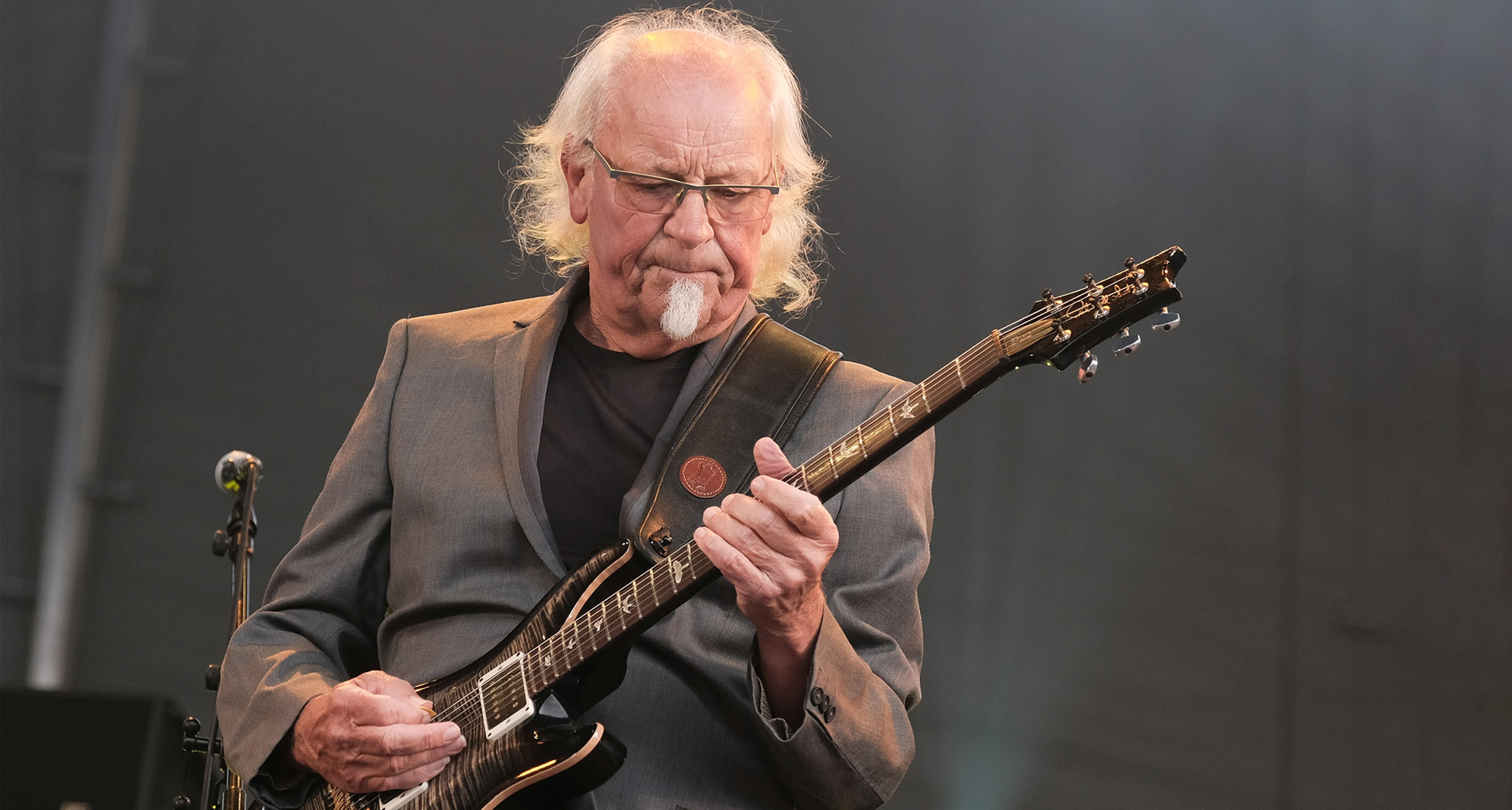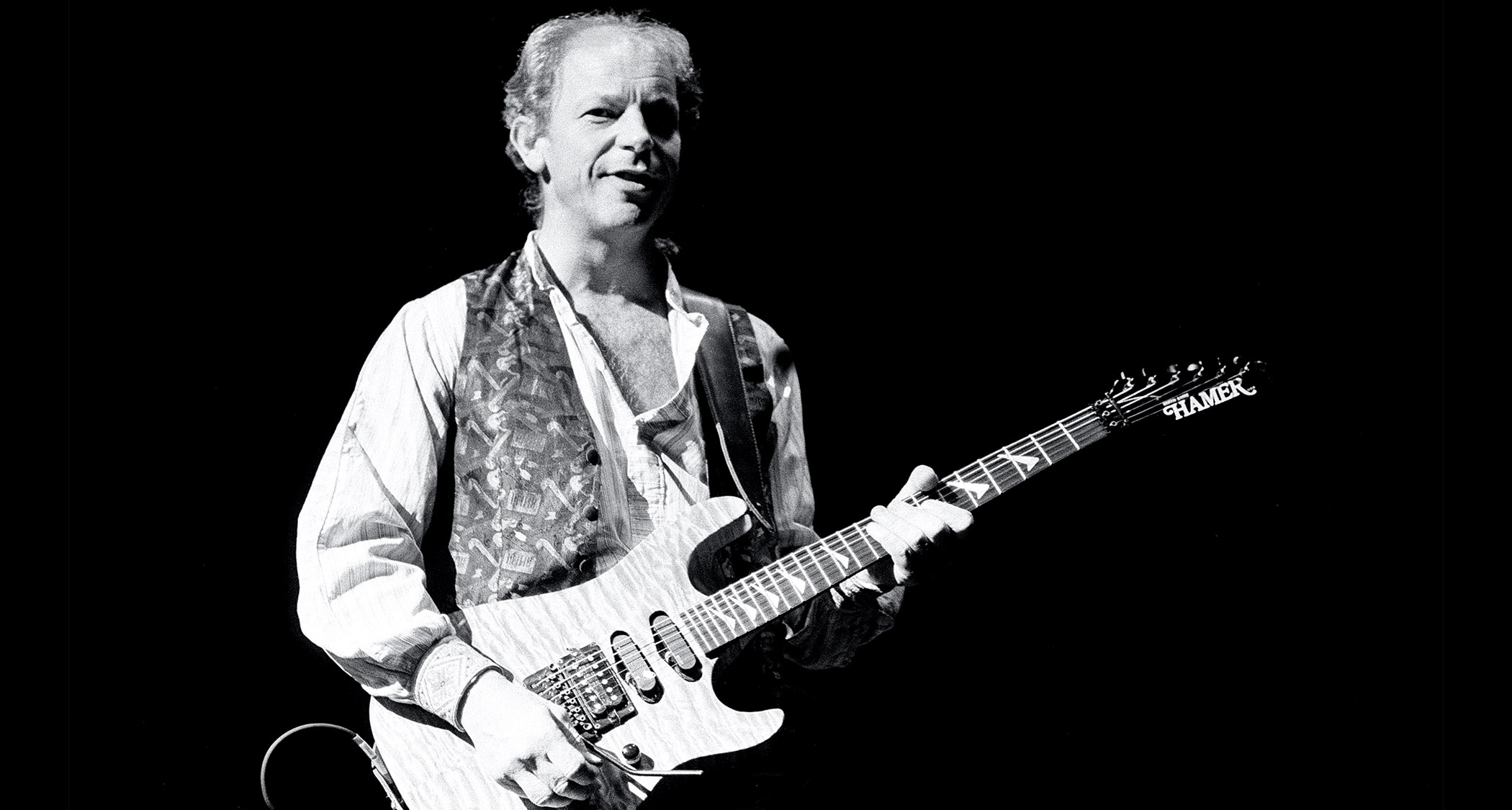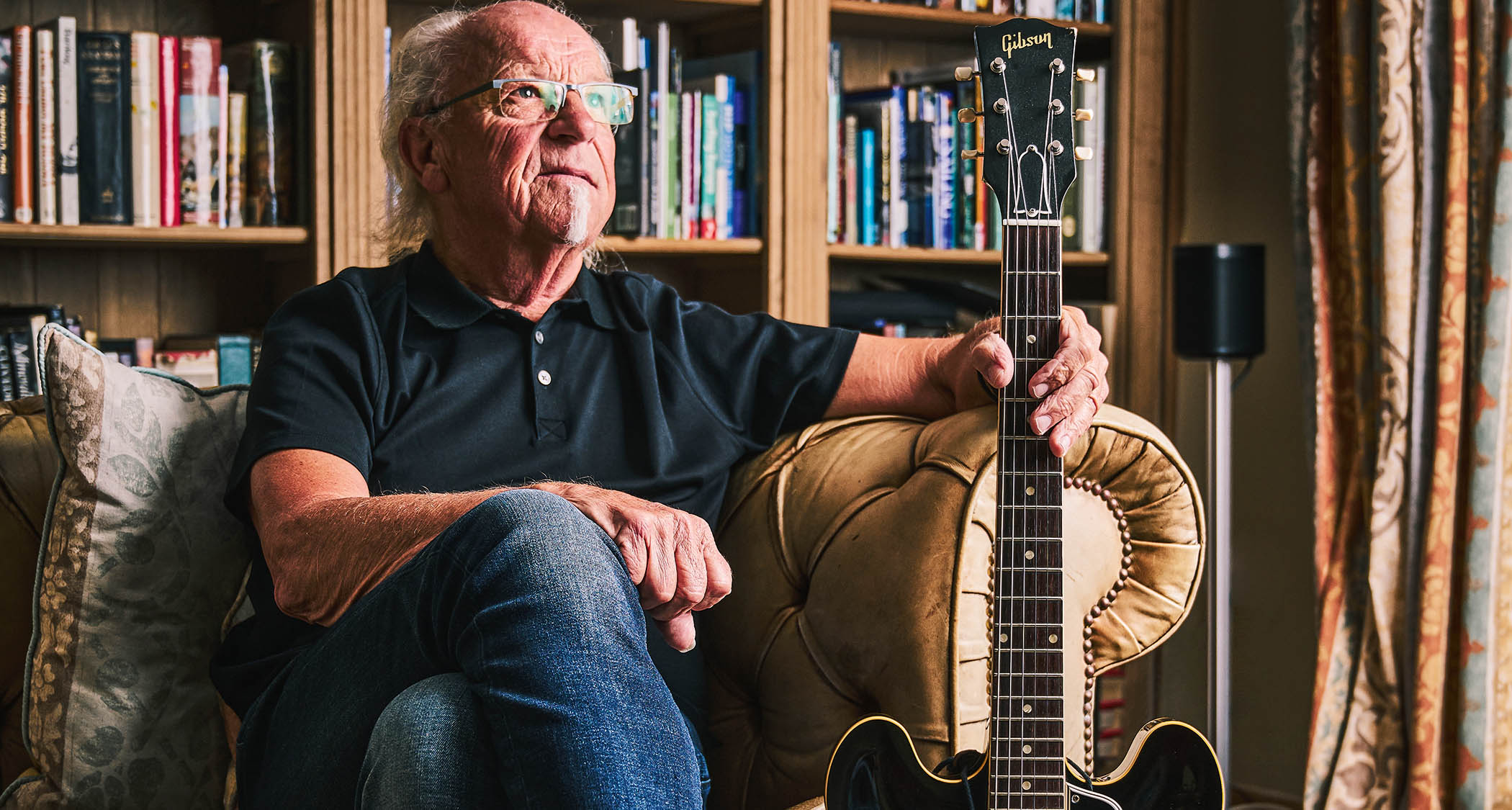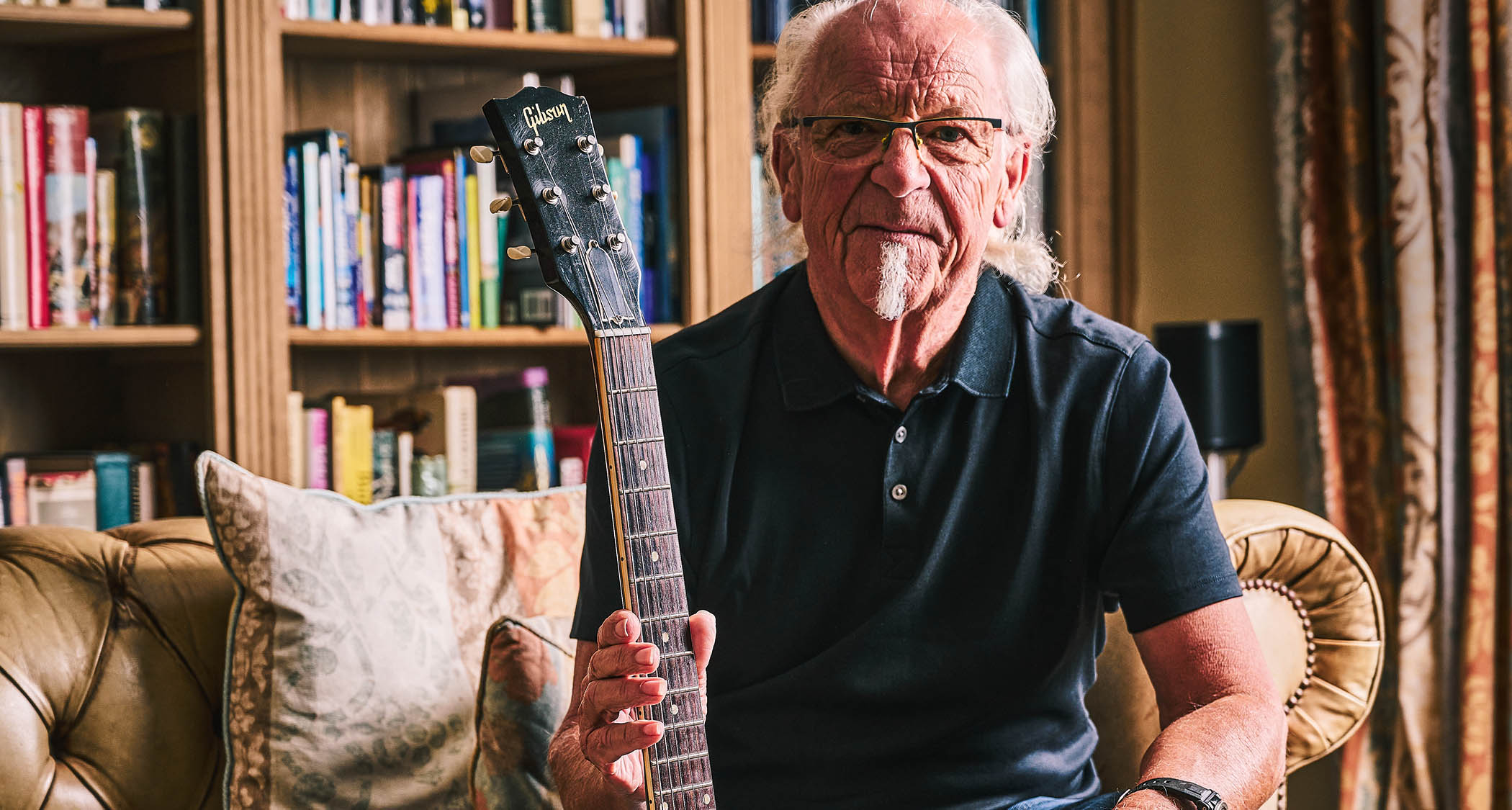“My wife heard Locomotive Breath on the radio. She said, ‘I wish you played like that now.’ I was a bit upset”: Martin Barre on revisiting Jethro Tull, Leslie West – and the bootleg Les Paul that bent like a banana
We might still have some trouble thinking of Barre as the "former Jethro Tull guitarist" but, here, as he anticipates his solo acoustic tour and looks back on the band's epic legacy, he is okay with it

Though he’s rightfully earned his place on electric guitar’s version of Mount Rushmore, Martin Barre has never been remotely interested in hero worship – especially when it comes to guitar heroes.
“I am not and never will be a guitar hero,” Barre emphatically tells Guitar World. “Not in this house, not in my world. It’s a concept I don’t understand. I love playing guitar. I love guitars. I love amps. I love sounds. I love music. But that concept doesn’t touch me.”
As far as his playing goes, the blues never really touched Barre either. That’s probably why he got along so well with Ian Anderson, leading to his tenure as Jethro Tull’s lead guitarist from 1968 to 2012. Sure, Barre respected guys like Buddy Guy and Albert King, but being like them never appealed to him, so unlike others, he never even tried.
“I like to find my own feel in music and discover ideas and techniques,” Barre says. “Discovering all there is about music is part of the piece. I want to figure it out myself because that’s half the fun. Ian and I had our favorite artists, like Roy Harper, Cat Stevens and [Captain] Beefheart, but it never soaked into what we were doing.”
Regardless of what Barre says, he is a guitar hero. What’s more, he’s a load-bearing pillar of prog rock and all things guitar-associated and adjacent to it. His solo in Jethro Tull’s Aqualung is the stuff of legend, and his riffs and interludes within Locomotive Breath, which battle Ian Anderson’s hyper-huffing flute work, are equally devastating, if not floor-thumping. Hell, in a way, it’s even kind of metal, in a medieval sort of way.
Still, when reminded of his exploits, which ranged from dropping prog odyssey in the ’70s to beating out Metallica for a Grammy in the ’80s to fighting the good fight against grunge in the ’90s, Barre shrugs, saying, “It was a broad scope of playing music.
“It wasn’t a monophonic experience,” he adds. “There’s so much in the music that you have, so you have to take a lot in. You have to be prepared to go to extremes and to encompass what’s going on. We never stood still musically. We were always learning and treading new ground.”
Get The Pick Newsletter
All the latest guitar news, interviews, lessons, reviews, deals and more, direct to your inbox!
Barre hasn’t been a part of Jethro Tull for 13 years, but legions of fans still will only accept him as the band’s guitar player. Barre is aware of this, and he too holds what he accomplished alongside Anderson in high regard – but that’s not all there is.
Not anymore. He’s released several solo records, and he tours behind them regularly. Yes, he does still play his favorite Tull cuts. And yes, this will be the case when he hits the road in the spring for a solo, all-acoustic jaunt. “It’s a mix of my instrumental music and some Tull acoustic songs,” Barre says of the tour.
The tour is notable for Barre, because the acoustic parts within the Tull’s music were mostly left to Anderson. “Toward the end of Tull,” he says. “I started doing a lot more acoustic guitar. It was like a discovery of this whole section of music called ‘acoustic music’ that I hadn’t delved into. It’s become a major part of what I’m doing. That whole area has opened up to me.”
When his tour kicks off, Barre will be 78. His playing remains lively, and his work ethic and intent to grow as a player remain unmatched. But once the tour wraps, he plans to sit back.
“I’m going to take a breather,” he says. “I really toured hardcore for the last three years. I want to rethink things. The Tull element will always be there because I’m Tull’s guitar player; I have that inside of me. But I really want to play more of my own music. I want to do a new album. There’s a lot more in me, but I need to step back from what I’m doing to think carefully about where to go next.
You’ve got an all-acoustic tour on tap. Is that all Jethro Tull songs or a mix of Tull and solo?
“I always do a mix because Tull is never enough for me. I love music and writing. I think that part of my persona is reflected in what I write and invent musically. It sounds pretentious, but essentially, I love playing my own compositions. Hopefully, people like them and enjoy the music.”

How do you go about translating songs originally recorded as electric to the acoustic setting?
“Some work, some done. But the Tull songs, thinking about what I’m doing, they’re all acoustic songs anyway. I’m a big fan of Ian’s acoustic writing. I think the best Tull songs are in the acoustic catalog, just because the melody and construction of the songs – and lyrically – don’t need changing. I don’t mess with them because they are what they are.”
What gear are you bringing out on the road with you?
“I’ve got a new acoustic made in Belfast, Ireland, by McNally. It's wonderful. It’s a beautiful guitar. I was lucky to get a slot because they make maybe one a month or slightly less. There’s a big waiting list for them.
“I called him up and told him what I was looking for, what I didn’t like about the acoustic guitars I’ve played in the past, and what I liked. We literally built the guitar by email! It’s better than I could have hoped for.”
Ian has said that when it comes to the acoustic sections of Tull’s songs, it was almost always him playing while you handled all the electric parts. Is that your recollection, too?
“Yeah, there was a defined line between electric and acoustic. More or less, I played all the electric and Ian played all the acoustic – but there was a crossover.”
Being a guitar wizard or guitar hero is for other people
Where was the crossover?
“There were songs where we both played acoustic, and there was even one time when it was just me. But on other songs, we both played flute. There were no rules or guidelines, but essentially, it became unspoken territory that I dealt with the electric stuff and Ian dealt with the acoustic stuff. It just seemed like a natural division.”
Was it ever uncomfortable sharing guitar-related space with Ian?
“No. I just wanted to be the best musician I could be. I’ll also play flute for an hour a day to improve my flute playing; I play mandolin because I love the technique of mandolin. For me, it’s about music’s broader concept. Being a guitar wizard or guitar hero is for other people.”

Be that as it may, you helped usher in and solidify prog rock. Were you aware of that at the time?
“I had absolutely no idea at all. [Laughs] I was completely blank. I don’t know what Ian would say, but we were very individual. We were on the road all around the world, but particularly in America, there was nobody like us, so there were no comparisons to be made. We played with other bands, but they were in a little bit of a different pocket musically. That continued for a long, long time. I think it’s still there now.”
Did you see yourself as an explicitly prog guitarist, or Tull as a “prog band”?
“I don’t consider it as a prog band. I can’t explain why; I just think it’s a very unique little area of the world in music that we created. We always went our own way. We were never influenced by producers, record companies and booking agencies. All the business side of music never touched us. We just wanted to make the music that we wanted to do. It went in all directions.”
One of those directions manifested as your Aqualung solo, which, for my money, is the epitome of a composition within a composition.
We were in New Zealand on a fabulous holiday, where they strangely played a lot of Jethro Tull on the radio, when my wife heard Locomotive Breath, she said, ‘I wish you played like that now.' I’m like, 'Oh, really?' I was a bit upset
“I don’t know… I feel I’m not qualified to talk about it because when I hear it, I hear all the little burps, and I go, ‘Did you really play that? Why did you do that?’”
That’s fair, but there’s no such thing as perfection, right?
“There’s no such thing as perfection. But then, my wife, when we were in New Zealand on a fabulous holiday, where they strangely played a lot of Jethro Tull on the radio, when she heard Locomotive Breath, she said, ‘I wish you played like that now.' I’m like, 'Oh, really?' I was a bit upset, like, ‘Is that a criticism?’ [Laughs]
“Essentially, it is, you know? Because you take something and try to develop it, and it’s so hard to… some songs should be left alone. They’re perfect, and they don’t need anything. And there’s something about the music of that era; it needs to be left where it started.”
That goes back to what we were saying before about ushering in sounds and the manifesting of certain directions.
“There was a naivety to my playing, for better or worse. But I can’t be naïve anymore. Maybe I have to overthink everything, constantly be aware of scales and right-handed technique, and try to play better every night. But essentially, that solo [in Aqualung] shouldn’t be touched. But I can’t play… I can’t go back to that. I can’t go back to what I was.”
But you can duplicate what you’ve laid to tape, no?
“It’s a very strange thing to even try and explain. I have total respect for the music of that era. It was written; it’s a historical event. Not just Tull, but when you hear Jimi Hendrix, Cream, Mountain and so many great bands, what they did in 1970, ’69 or ’72 is perfect.”

So, in that way, there is such a thing as perfection.
“The sound is perfect because they’d invented the music, and within the music was the sound and construction of the music. Everything was faulted, but it was perfect at the time.
“But now it can’t be because everybody knows a lot more about music and scales. We’re trying to push ourselves to get better tones and have a more interesting construction of solos.”
Would you go back to that if you could?
“I think it’s a danger to overthink things. But luckily, I’m not a wizkid player. My solos were fairly basic and are still fairly basic. There’s lots of crotchets. [Laughs]”

Going back to Aqualung, is it true that if you didn’t nail that take, Ian was prepared to replace your guitar solo with a flute solo?
“Yeah. [Laughs] It was never spoken of, but essentially, you had a couple of gos. You didn’t get 10 shots at a solo because the rest of the band had walked out; that’s what you got. If that’s the way it was for other bands, I don’t know, but we just didn’t do that. I remember reading about Brian May and how long he would take constructing his solos, like, days.
“It might not be true, but I was amazed. I could never have been there, and even today, it’s got to have that sort of inspiration. It’s got to have that fluidity, an instant improvisation. I still do solos in one or two takes, and they’re going to be the best ones. If you overthink it, it starts going downhill. That’s just me on my own. I mean… I could spend a month doing a solo if I wanted to, but I never, ever will.”

Jimmy Page was in the control room watching the take that ended up on the Aqualung record. Did he like what he heard?
“Oh, no. Nobody was like that. [Laughs] We didn’t say, ‘Oh, I love your playing.’ We were all mates, and it was fun. It was more like a little club, but that wouldn’t have happened.
“We all liked each other and got on well, and we were in the same little strange group of people flying all over from England, bubbling with excitement and playing to huge audiences.
“We were all lucky and privileged to do it, and that’s what we shared. It wasn’t a particularly musical relationship. You all did the same thing, so you knew how much fun it was to do it.”
You used a bootleg Les Paul on 1970’s Benefit. Did you use that same guitar for Aqualung, which came out in ’71?
“Oh, it was gone by then. I left it in a car one summer’s day, and when I came back, it was like a banana. [Laughs] So that had to go on holiday. But I’d met Leslie West, and like a lot of guitar players, you couldn’t meet Leslie West and come out unscathed. I loved him to bits. I loved his playing. I loved his presence. And I loved Mountain.
“Everything about them was a learning curve. Not just the guitar playing but everything about their arrangements. So, like a lot of people, I bought a [Gibson] Les Paul Junior because Leslie had one. So, Aqualung, I think, was a ’58 Les Paul Junior, and I still had my Hiwatt; I hadn’t retired it yet, though it was soon to be. And I had a really tasty ’58 Fender Strat. It was simple – no pedals, nothing. Just a guitar into the amp – off you go.”
Interesting, as there’s a song on 1977’s Songs from the Wood called Pibroch (Cap in Hand), which has a gnarly fuzz tone and didn’t sound as simplistic.
“I remember doing that. It was just me and Ian. Ian, being Scottish, had taken up a bit of an interest in his Scottish upbringing. He’d been listening to bagpipe music, and he said, ‘It’s not quite rock ’n’ roll, but the phrasing and simplicity is almost pentatonic.’ So he lent me some bagpipe albums, and I was thinking, ‘This isn’t gonna last long; I don’t sound like a bagpipe player…’ [Laughs]
“But it sort of got to me, you know? There’s something haunting, dynamic and simple – but powerful – about the phrasing. That’s what we brought into Pibroch. I remember doing it, and I have no idea how it was formulated; I was there on my own in the studio, and I just played, but not to a click track.
“I’ve got no idea, but it was a basic idea of where the chords move to; it’s the timing, which sort of skips over the bar. It’s a feel rather than anything you could notate.”
In the ’80s, Ian added a lot of synths to Tull’s music, sometimes pushing your guitar playing to the side. But there’s a track called Steel Monkey from 1987’s Crest of a Knave that really rocks.
“Well, we had fun with them [the synths], but in retrospect, they were awful. [Laughs] Apologies to keyboard players everywhere; I mean, I love Hammond organs and concert piano; they’re beautiful. But I’m not crazy about the sounds that come out of a keyboard. That period was funny; it was all new, and people were using sequencers to get these amazing noises and ideas.
“Really, it was more of a tool to make music than it was a musical instrument. We could play around with the sequencer and build songs around it. And the songs that you’ve mentioned, Aqualung, Pibroch and Steel Monkey, I play in the Martin Barre [solo] set. But Steel Monkey was really fun; it was a framework of sequences, and the solos were just easy, nice and fun to play.”
![Ian Anderson [left] has a maniacal look on his face as Martin Barre takes a solo onstage. This black-and-white live shot of Jethro Tull was taken in 1982 at London's Wembley Arena.](https://cdn.mos.cms.futurecdn.net/j7MaVwcFBifpecJMxN6iRF.jpg)
Notoriously, Crest of a Knave beat out Metallica’s ...And Justice for All for the Grammy for Best Hard Rock/Metal Performance Vocal or Instrumental.
“It was surreal. We were in the U.K., and we were told that we were nominated, and we were like, ‘Wow… we’re nominated for a Grammy?’ but there was no thought that we would get it. And the record label in the U.K. [Chrysalis] said, ‘You’re not going to get it.’ So, I mean… I didn’t think we’d get it.
“And because they said, ‘Metallica are huge, and they’ve got a big presence at the ceremony and are going to play there, they’re going to wipe you out.’ And even though we were invited to go, the record company said, ‘No, we’re not going to fly you over. You’re not going to win. Just stay home.’ So we just sat at home.”
What was your reaction when you won?
“I was home with the family, and I got a phone call saying, “You’ve won a Grammy.” We were like, ‘You’ve got to be kidding.’ But I was really pleased. I’m really proud of that. We had a huge party; it was brilliant.
“It means a lot to me, but it could either mean nothing or everything. It was a weird category, sort of fuzzy around the edges. But essentially, that album obviously deserves that award taken as a single entity.”
Is there a particular aspect of your playing that has been most challenging to improve?
“My rhythm playing has developed. In the beginning, I was a terrible rhythm player. I sort of avoided it like the plague. But Steve Lukather famously has said that most of his sessions were playing rhythm guitar, and that made me sit up and take notice.”
How did you work to improve?
“I examine every aspect of what I do. It could be my left-handed technique, using my little finger, more bending notes with it, scales, modes, or listening to and trying to play classical.
“There’s always some aspect that will grab me, and right now, it’s my right-handed technique. I knew that I needed to up my rhythm game. Even in playing solos, the rhythm of what you’re playing is vital for the feel. You can’t not be a good rhythm player. You have to understand it and feel it; otherwise, you’re not a complete player.”
Ian has talked a lot about how players like Mick Abrahams and Tony Iommi didn’t work for Tull and that it was your open-mindedness beyond the blues that made you stick. Did you feel that way, too?
“It might have been a coincidence, or it might be just that me and Ian were the only two guys that thought like that in the world. [Laughs] I don’t know… I was quite obstinate in my thought process, but essentially, the music of the mid ’60s, and the impact in England was that blues, you know, all the Buddy Guy’s, Albert King’s, they came to England, and they would stop from station to station – London, Birmingham and Manchester – to perform and play.
“It was amazing because nobody was really exposed to the blues, and it just took over music in the U.K. – particularly guitar players, because before that, it was soul music. It wasn’t particularly guitar-oriented music that bands were playing. The blues was the door that opened for all the guitar players to really start playing guitar.”
But you and Ian thought differently.
“As much as I loved all of what I saw on TV, all the kids played the same, you know? They all learned the licks; I didn’t want to do it. I just thought, ‘No, I don’t want to be a second-hand Albert King.’ I thought, ‘He’s amazing; leave him alone. You’re not going to be as good as that.’
“I’ve always not gone with the crowd. It’s my mindset that if everybody goes that way, I’m going to go the other way. That’s made me more open-minded.”
No matter what you do, there’s a massive camp of people who will always feel that you’re Jethro Tull’s guitar player. Do you feel that way, too?
We’ve done lots of things outside of our comfort zone that took us somewhere we’d never been – and we enjoyed doing it. That’s what I want to continue doing
“Well, emotionally, part of me is detaching because I always tell people, “It doesn’t own me, but I own it.” It’s a big difference. I’m very proud of it. I want to keep flying the flag as far as the music of Jethro Tull being out there and being played – but it’ll never be enough.”
Never enough just to play it, or never enough only to play it?
“It’s my heritage. I couldn’t be happier having that heritage – but it’s just a part of it. I’ve always looked at other things to do, other styles of music and projects. I’m the same as Ian, really. He’s done other things, other projects.
“We’ve done lots of things outside of our comfort zone that took us somewhere we’d never been – and we enjoyed doing it. That’s what I want to continue doing. I don’t know what I’m going to be doing next year, but I’m going to have fun finding out what it’s going to be.”
- Martin Barre is currently on tour across the US – see MartinBarre.com for full dates.
Andrew Daly is an iced-coffee-addicted, oddball Telecaster-playing, alfredo pasta-loving journalist from Long Island, NY, who, in addition to being a contributing writer for Guitar World, scribes for Bass Player, Guitar Player, Guitarist, and MusicRadar. Andrew has interviewed favorites like Ace Frehley, Johnny Marr, Vito Bratta, Bruce Kulick, Joe Perry, Brad Whitford, Tom Morello, Rich Robinson, and Paul Stanley, while his all-time favorite (rhythm player), Keith Richards, continues to elude him.
You must confirm your public display name before commenting
Please logout and then login again, you will then be prompted to enter your display name.











![[from left] George Harrison with his Gretsch Country Gentleman, Norman Harris of Norman's Rare Guitars holds a gold-top Les Paul, John Fogerty with his legendary 1969 Rickenbacker](https://cdn.mos.cms.futurecdn.net/TuH3nuhn9etqjdn5sy4ntW.jpg)







